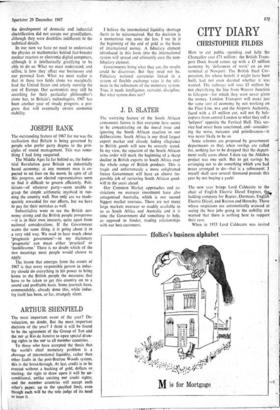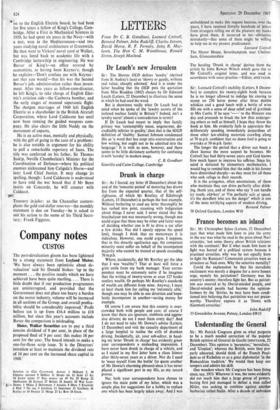CITY DIARY
CHRISTOPHER FILDES
How to cut public spending and help the Chancellor save £71 million: the British Trans- port Dock board comes up with a £3 million economy by 'deferment of work' on an ore terminal at Newport. The British Steel Cor- poration, for whose benefit it might have been built, had not even decided whether it was wanted. The railways will save £5 million by not electrifying the line from Weaver Junction to Glasgow—for which they were never given the money. London Transport will make just the same sort of economy by not working on the Fleet Line. BEA and the Airports Authority, faced with a £3 million cut, will not fly heli- copters from central London to what they call a `heliport' opposite the Festival Hall. This ser- vice had never been sanctioned, and—consider- ing the noise, nuisance and pointlessness—it was never likely to be so.
Some schemes are proposed by government departments so that, when savings are called for, nothing has to be dropped that the depart- ment really cares about. I dare say the Aldabra project was one such. But to get savings by arranging not to do something which you had never arranged to do—that is a refinement. I myself shall save several thousand pounds this year by not buying a yacht.
The new year brings Lord Caldecote to the chair of English Electric Diesel Engines, %G., holding company for Rapier, Dormans, English Electric Diesel, and Ruston and Hornsby. Those whose suspicions are automatically aroused at seeing the best jobs• going to the nobility are warned that there is nothing here to support their case.
When in 1953 Lord Caldecote was invited
on to the English Electric board, he had been for five years a fellow of King's College, Cam- bridge. After a First in Mechanical Sciences in 1939, he had spent six years in the Navy—with a DSC, won in the Mediterranean—and two years studying naval architecture at Greenwich. He then went to Vickers' naval yard at Walker, but was lured back to academic life with a Cambridge lectureship in engineering. He was Bursar of King's—an office revered by economists, as having been Keynes's; though he explains—`Don't confuse me with Keynes : not that you would'—that his was the Second Bursar's job, administration rather than invest- ment. After two years as fellow-cum-director, he left King's, to take charge of English Elec- tric's aviation side—the Canberra bomber, and the early stages of manned supersonic flight. The shotgun marriages of 1960 left English Electric as a shareholder in the British Aircraft Corporation, where Lord Caldecote has until now been running the guided weapons com- pany. He also chairs the little Neddy on the movement of exports.
He is an active man, mentally and physically, with the gift of going to the core of a problem: he is also notable in argument for his ability to pull a remarkable repertory of faces. The title was conferred on his father, Sir Thomas Inskip, Neville Chamberlain's Minister for the Coordination of Defence—where his political enemies nicknamed him Caligula's Horse—and later Lord Chief .Justice. It may change its spelling, though: Lord Caldecote is understood to have told the BAC board that if Mr Benn insists on Concorde, he will counter with Caldecot.
Treasury in-joke: as the Chancellor contem- plates the gold and dollar reserves—the monthly statement is due on Tuesday—he is asked to suit his action to the name of his Third Secre- tary : Frank Figgures.











































 Previous page
Previous page